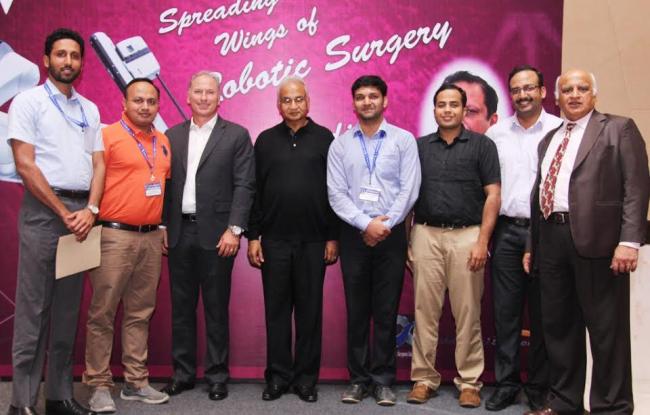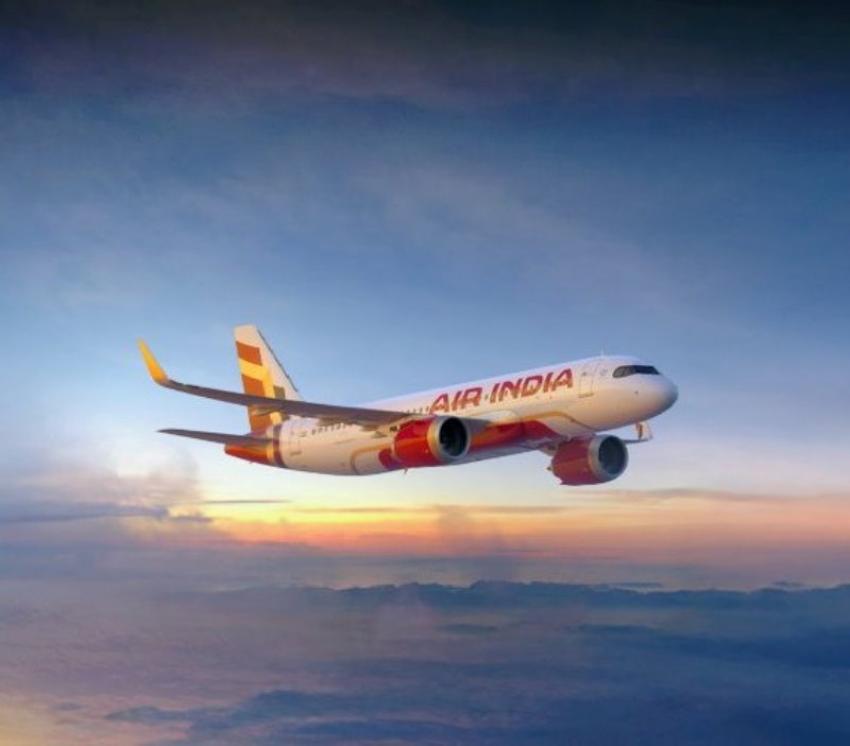News
India
Indian surgeons devising new techniques for robot-assisted surgeries
16 Nov 2016, 10:03 am

Mumbai, Nov 14 (NITN): Early detection of cancer is critical to improving the quality of life of those suffering from this life threatening scourge. Early detection is a surer way to add more years to a cancer patient's life.
Technology companies are working on breakthrough solutions in cancer detection and treatment for the near future, a US expert in robotic surgery has said.
A WHO Globocan 2012 survey placed India’s cancer incidence at 10,14,934 cases with mortality number touching 6,82,830.
Dr Catherine Mohr, Vice President for Strategy at Sunnyvale-headquartered surgical robot maker, Intuitive Surgical Inc., describes a Stage-1 cancer patient as one facing a ‘speed bump’ while a Stage-4 cancer patient is closer to ‘crashing into a big brick wall', reducing the chances of survival beyond five years.
A patient detected with Stage-4 lung cancer has only a 15 per cent chance of survival beyond five years. Early detection of the lung cancer gives patients 80 per cent chance of living beyond five years, Dr Mohr said while speaking to 200 Indian Robotic Surgeons
A Surgical Robot is especially suitable for complicated surgeries and situations needing reconstruction of body parts as it leads to significantly lower complications, readmissions and mortality as compared to traditional open surgery.
Surgical Robots are changing the method of accessing the interiors of the body by unambiguously identifying and removing cancerous cells and retaining good cells. Health insurers in many European countries pay a premium for Robotic Surgery because the patients spend less time in hospital and are able to get back to work faster.
Dr Mohr, who is also a consulting professor at Stanford School of Medicine, was presenting on ‘New Horizons of Surgical Technology’ at the bi-annual RSC meet at the initiative of Vattikuti Foundation, a US non profit.
Experts allayed fears that a surgical robot may someday replace surgeons, saying that robots will not replace a surgeon anytime soon because a surgeon's experience and surgical judgment cannot be replicated by a machine.
Today, nearly 500 robotic surgeries a month are conducted in India, ranging from removal of cancerous tissues to reconstruction of organs damaged by cancer as well as the removal of organs such as the kidney, liver, pancreas, thyroid, prostrate, and uterus.
A Surgical Robot scores over conventional modes of surgery as it leads to minimal blood loss, quick healing and less pain, leading to shorter hospital stays. Surgical Robots are being used in almost all specialties involving soft body tissues.
Michael Hall, International Training Manager, Intuitive Surgical unveiled a plan for continuing training for existing Robotic Surgeons and induction of new surgeons. The company will join hands with Vattikuti Foundation to speed up its plan to enhance the pool of robotic surgeons to 500 by 2020.
The Vattikuti Foundation is striving to grow the pool of Robotic Surgeons in the country.
A WHO Globocan 2012 survey placed India’s cancer incidence at 10,14,934 cases with mortality number touching 6,82,830.
Dr Catherine Mohr, Vice President for Strategy at Sunnyvale-headquartered surgical robot maker, Intuitive Surgical Inc., describes a Stage-1 cancer patient as one facing a ‘speed bump’ while a Stage-4 cancer patient is closer to ‘crashing into a big brick wall', reducing the chances of survival beyond five years.
A patient detected with Stage-4 lung cancer has only a 15 per cent chance of survival beyond five years. Early detection of the lung cancer gives patients 80 per cent chance of living beyond five years, Dr Mohr said while speaking to 200 Indian Robotic Surgeons
A Surgical Robot is especially suitable for complicated surgeries and situations needing reconstruction of body parts as it leads to significantly lower complications, readmissions and mortality as compared to traditional open surgery.
Surgical Robots are changing the method of accessing the interiors of the body by unambiguously identifying and removing cancerous cells and retaining good cells. Health insurers in many European countries pay a premium for Robotic Surgery because the patients spend less time in hospital and are able to get back to work faster.
Dr Mohr, who is also a consulting professor at Stanford School of Medicine, was presenting on ‘New Horizons of Surgical Technology’ at the bi-annual RSC meet at the initiative of Vattikuti Foundation, a US non profit.
Experts allayed fears that a surgical robot may someday replace surgeons, saying that robots will not replace a surgeon anytime soon because a surgeon's experience and surgical judgment cannot be replicated by a machine.
Today, nearly 500 robotic surgeries a month are conducted in India, ranging from removal of cancerous tissues to reconstruction of organs damaged by cancer as well as the removal of organs such as the kidney, liver, pancreas, thyroid, prostrate, and uterus.
A Surgical Robot scores over conventional modes of surgery as it leads to minimal blood loss, quick healing and less pain, leading to shorter hospital stays. Surgical Robots are being used in almost all specialties involving soft body tissues.
Michael Hall, International Training Manager, Intuitive Surgical unveiled a plan for continuing training for existing Robotic Surgeons and induction of new surgeons. The company will join hands with Vattikuti Foundation to speed up its plan to enhance the pool of robotic surgeons to 500 by 2020.
The Vattikuti Foundation is striving to grow the pool of Robotic Surgeons in the country.
Hall recognised 7 Vattikuti Fellows, including one international Vattikuti fellow and 27 Vattikuti Scholars.
“At this year’s RSC we brought in more experts in the emerging areas for Robotic Surgery--Colorectal, and Head & Neck surgery. Indian surgeons are now devising new techniques for complex robot-assisted surgeries in these areas. Robotic Surgery results in superior patient outcomes,” says Dr Mahendra Bhandari, Director, Robotic Research and Education, Vattikuti Urology Institute, Henry Ford Hospital, Detroit, USA and CEO of Vattikuti Foundation.
.jpg) Dr. Emre Gorgun, an accomplished Robotic Surgeon specialising in colorectal surgery at the Cleveland Clinic, USA, delivered the second keynote address on the new advancements in colorectal surgery at the meet.
Dr. Emre Gorgun, an accomplished Robotic Surgeon specialising in colorectal surgery at the Cleveland Clinic, USA, delivered the second keynote address on the new advancements in colorectal surgery at the meet.
The RSC featured 20 sessions covering specialisations in Urology (robotic kidney transplant, urology in pediatric patients, urinary incontinence among prostrate removal cases), Gynaecology (breast cancer, hysterectomy, ovarian tumours), Thoracic (lung surgery), Head & Neck (oral cancer, sleep apnea), Bariatric (including gastric bypass) and Colorectal. Challenges in preparing accomplished Robotic Surgeons and emerging technological interfaces for surgery will also be among the subjects for discussion.
Over 40 surgeons from Tata Memorial Hospital, All India Institute of Medical Sciences, Rajiv Gandhi Cancer Institute & Research Centre, Kokilaben Dhirubhai Ambani Hospital, Medanta Medcity, Apollo Hospitals, Max Hospitals, Amrita Hospital, Delhi State Cancer Institute, Asian Heart Institute, Fortis Hospitals, and others, shared best practices and notes on advancements in Robotic Surgery.
Each surgical robot has four arms that can reach organs and areas inside the body where human fingers cannot.
“At this year’s RSC we brought in more experts in the emerging areas for Robotic Surgery--Colorectal, and Head & Neck surgery. Indian surgeons are now devising new techniques for complex robot-assisted surgeries in these areas. Robotic Surgery results in superior patient outcomes,” says Dr Mahendra Bhandari, Director, Robotic Research and Education, Vattikuti Urology Institute, Henry Ford Hospital, Detroit, USA and CEO of Vattikuti Foundation.
.jpg) Dr. Emre Gorgun, an accomplished Robotic Surgeon specialising in colorectal surgery at the Cleveland Clinic, USA, delivered the second keynote address on the new advancements in colorectal surgery at the meet.
Dr. Emre Gorgun, an accomplished Robotic Surgeon specialising in colorectal surgery at the Cleveland Clinic, USA, delivered the second keynote address on the new advancements in colorectal surgery at the meet.The RSC featured 20 sessions covering specialisations in Urology (robotic kidney transplant, urology in pediatric patients, urinary incontinence among prostrate removal cases), Gynaecology (breast cancer, hysterectomy, ovarian tumours), Thoracic (lung surgery), Head & Neck (oral cancer, sleep apnea), Bariatric (including gastric bypass) and Colorectal. Challenges in preparing accomplished Robotic Surgeons and emerging technological interfaces for surgery will also be among the subjects for discussion.
Over 40 surgeons from Tata Memorial Hospital, All India Institute of Medical Sciences, Rajiv Gandhi Cancer Institute & Research Centre, Kokilaben Dhirubhai Ambani Hospital, Medanta Medcity, Apollo Hospitals, Max Hospitals, Amrita Hospital, Delhi State Cancer Institute, Asian Heart Institute, Fortis Hospitals, and others, shared best practices and notes on advancements in Robotic Surgery.
Each surgical robot has four arms that can reach organs and areas inside the body where human fingers cannot.
Entering the soft tissue of the patient through pencil-sized holes, the arms of a surgical robot are even capable of operating on blood vessels and valves within the heart, using a suture that is thinner than human hair.
The surgeon sits at a robotic console and enjoys magnified three-dimensional high-definition visualisation.
Instead of long, handheld surgical tools, the surgeon controls tiny surgical instruments that have wrist movement which follow the surgeon’s finger tips gently moving robotic controls and leading to very precise surgery inside their patient.
“The growing interest among hospitals to equip themselves with new-age Surgical Robots especially from non-metro cities is encouraging. A steady rise in the number of hospitals adopting Robotic Surgery to nearly 40, augurs well for the patients from smaller cities who were constrained by the non-availability of cancer treatment nearer home,” adds Gopal Chakravarthi, CEO of Vattikuti Technologies, the Indian company working with Indian hospitals to make robotic surgery affordable to the masses in India.
“The growing interest among hospitals to equip themselves with new-age Surgical Robots especially from non-metro cities is encouraging. A steady rise in the number of hospitals adopting Robotic Surgery to nearly 40, augurs well for the patients from smaller cities who were constrained by the non-availability of cancer treatment nearer home,” adds Gopal Chakravarthi, CEO of Vattikuti Technologies, the Indian company working with Indian hospitals to make robotic surgery affordable to the masses in India.
More News
- Shiny things by Jinia: A luxury evolution by visionary entrepreneur, healer
- Mystique and Memories: Wiccan Brigade hosts its first Halloween Fest in Kolkata
- Rotary Club of Calcutta Samaritans hosts three-day youth leadership awards program for tribal students in Bakura
- Rotary Club, South Kolkata Vision inaugurate newly developed children's park in Sonarpur
- Akhil Bharat Jaiguru Sampradaya and Omkarnath Mission volunteers care for terminally ill patients at Mahamilan Math hospice
- Bengali couple promoting Indian music and culture among young Americans
- Indi Setu: Wildlife on the Brink: Can We Rewild a Warming World?
- Durga Puja sustainability: One of the oldest awards goes flex-free
- Ayurveda and Skin Health in the Modern Age
- MedSage expands footprint with new branch in Rampurhat
Air India reinstates codesh ...
Tata Group-owned Air India on Sunday announced the reinstatement of its codeshare agreement with fellow Star Alliance carrier, Air Canada, to offer more flight options for travellers and boost connectivity between India and Canada.
IndiGo launches Bengaluru&n ...
Starting Nov 16, 2025, IndiGo will operate direct flights between Bengaluru and Riyadh, expanding its network to Saudi Arabia.
American Airlines introduce ...
American Airlines will launch new seasonal service between New York (JFK) and Edinburgh, Scotland (EDI) in March 2026, expanding its international network.





